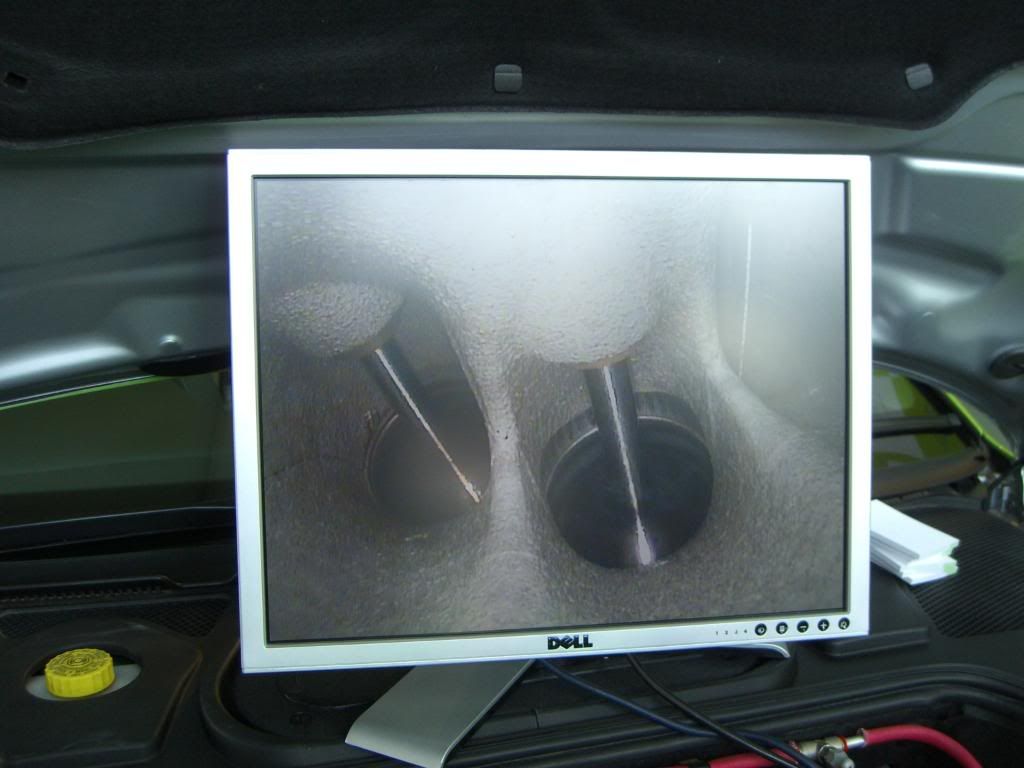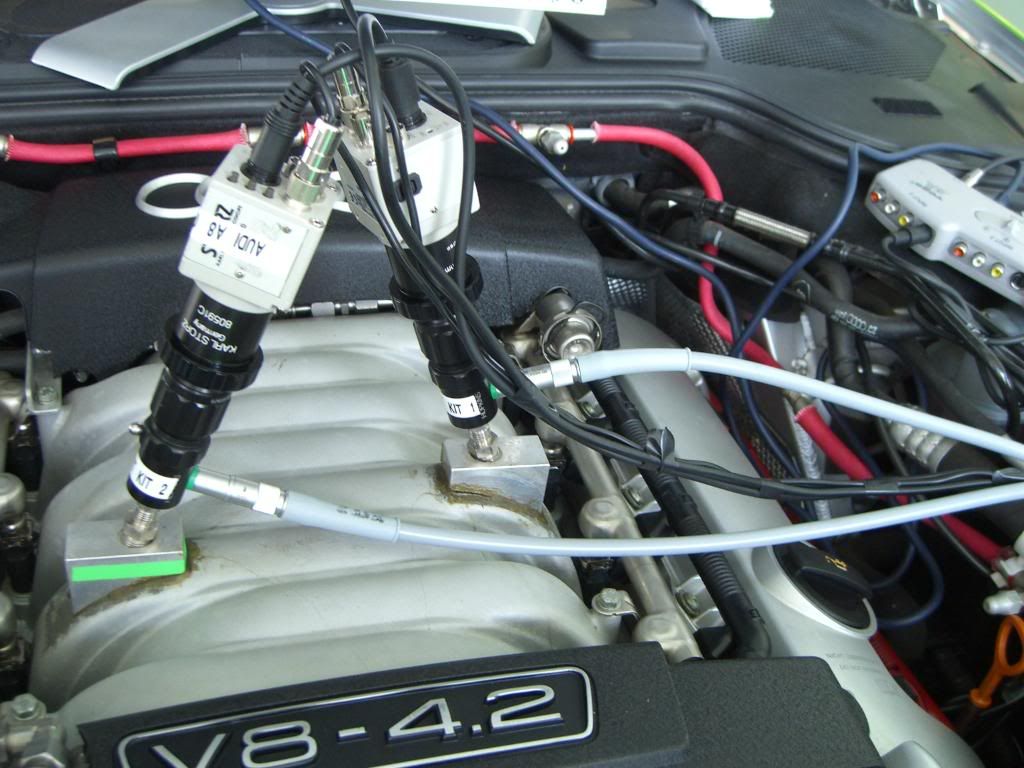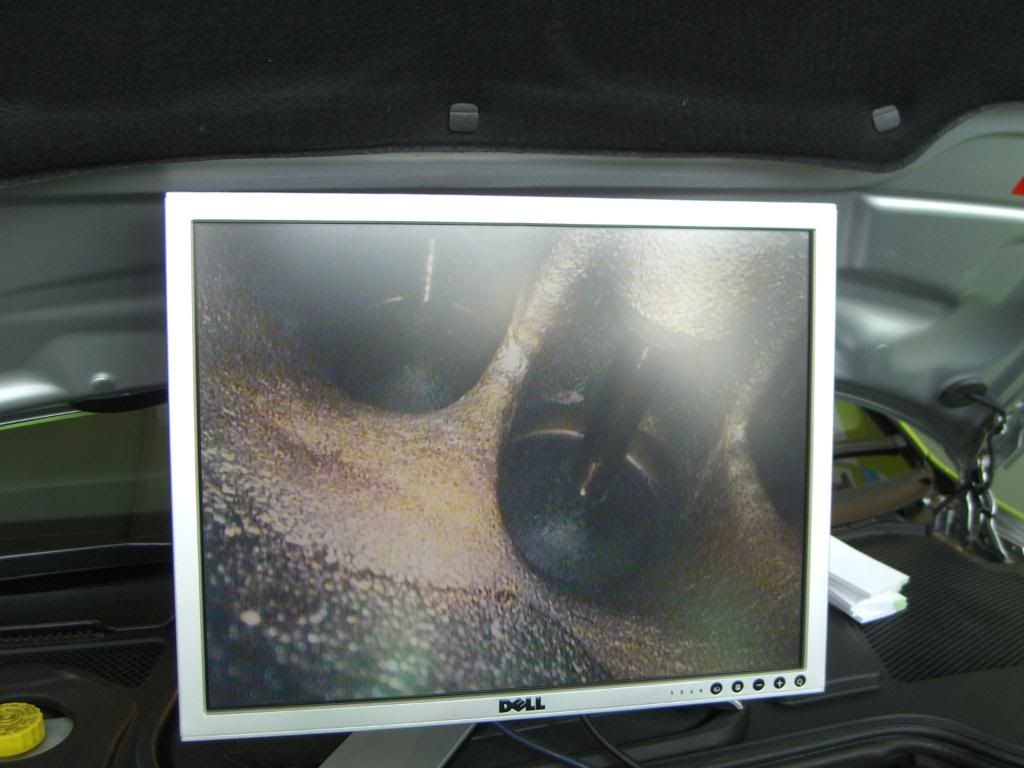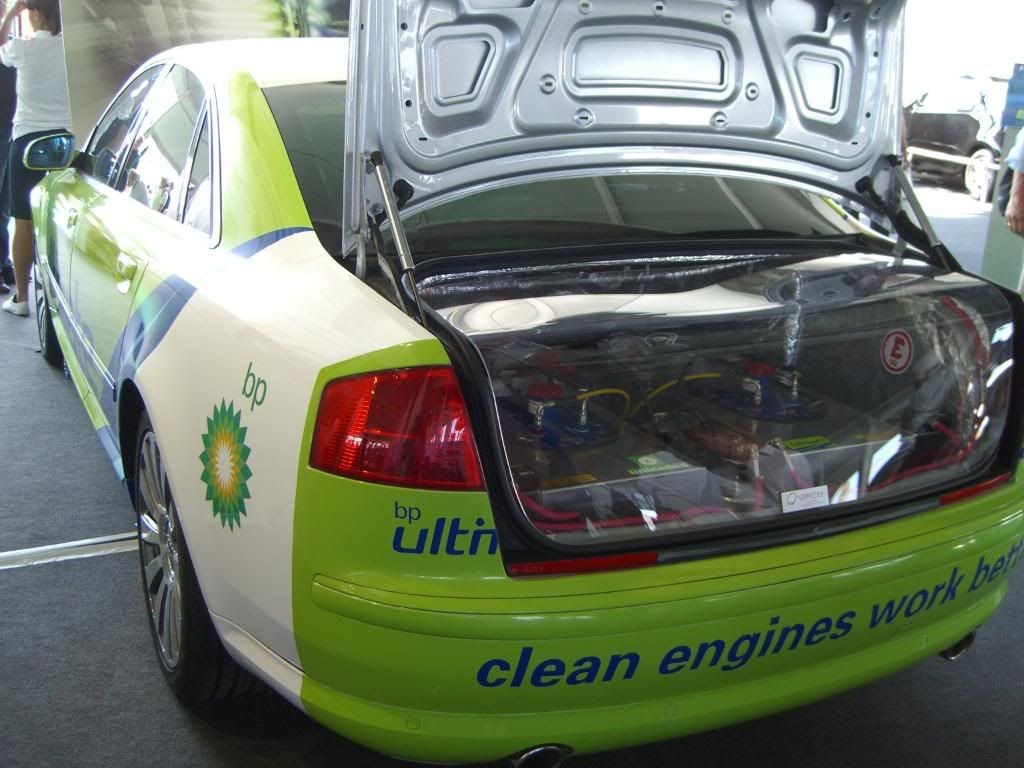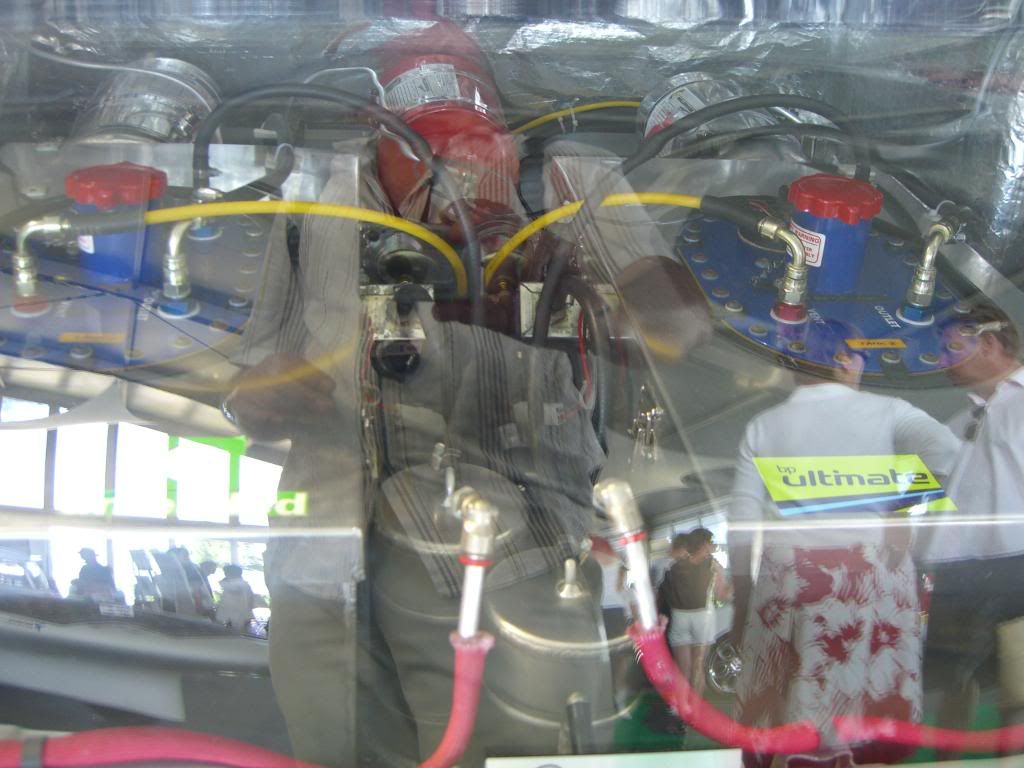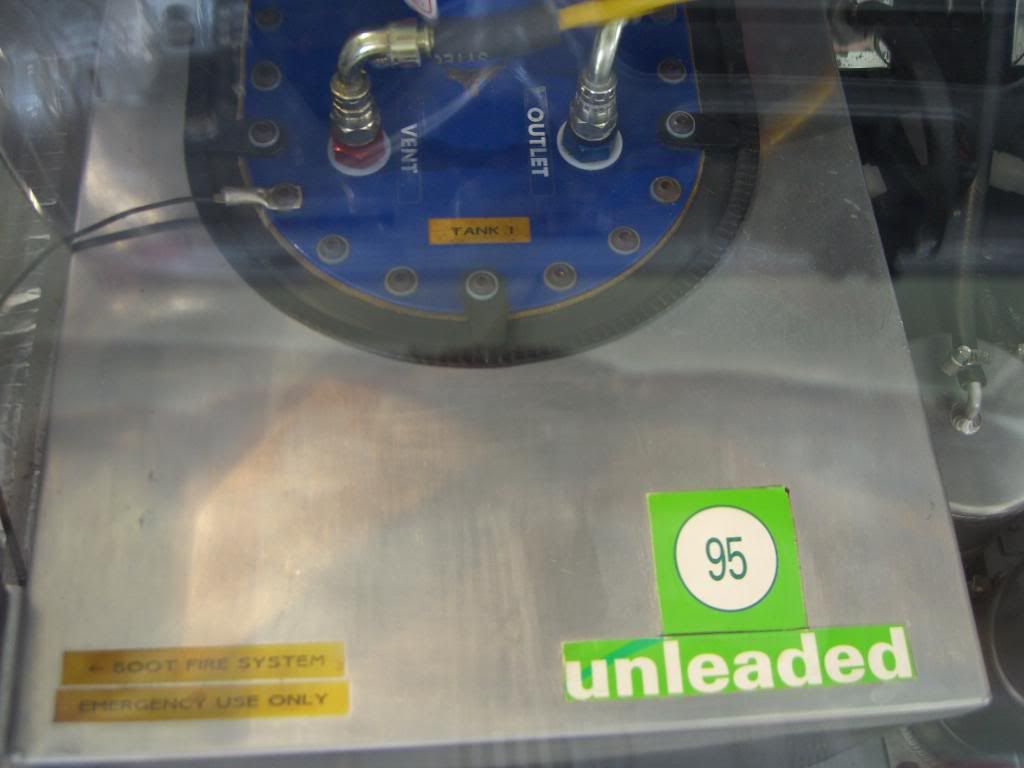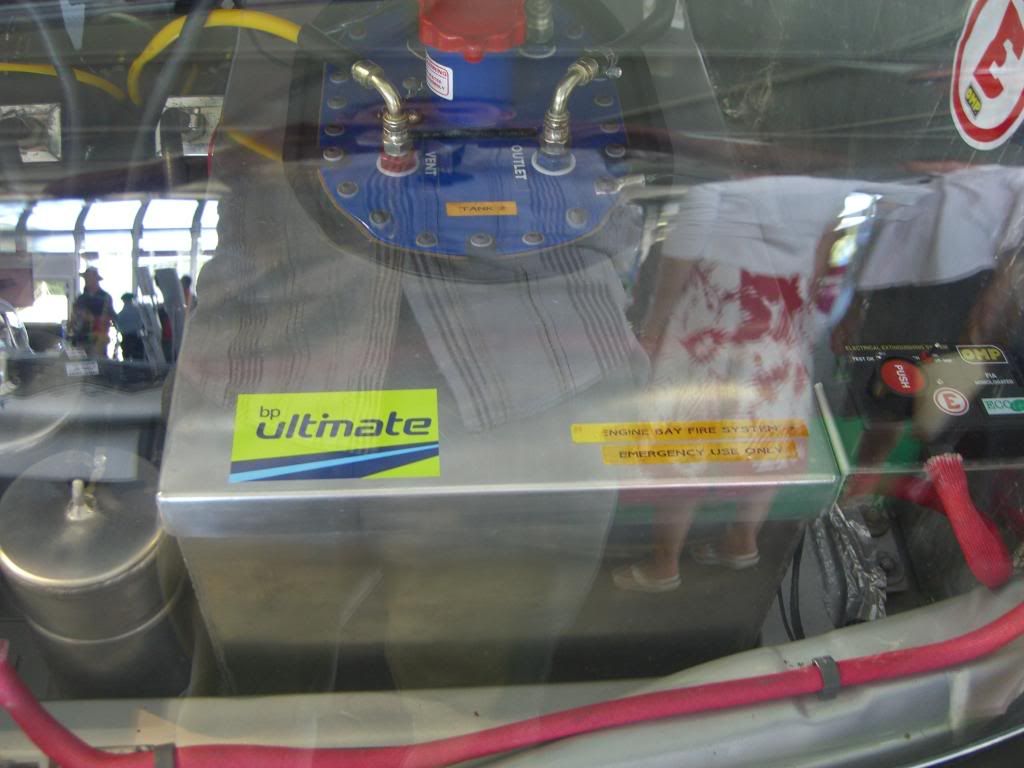Heads up Carbon on Porky DI engines
Discussion
Andyuk911 said:
You are talking about a DIFFERENT issue to me.
To be clear, if you run a DI engine on the super duper fuel it WILL carbon up.
If you run a 996 etc 'normal' injection on super duper fuel it will NOT carbon up.
What you are speaking about is LOW GRADE GAS in the USA, this is NOT relevant to this thread.
Don't forget the US and Europe use different RON/MON ratings for the same fuel. Although having said that the west coast CA/OR/WA are allegedly changing the fuel chemical structure. To be clear, if you run a DI engine on the super duper fuel it WILL carbon up.
If you run a 996 etc 'normal' injection on super duper fuel it will NOT carbon up.
What you are speaking about is LOW GRADE GAS in the USA, this is NOT relevant to this thread.
D900SP said:
This has been a problem for many years: The 928 had similar problems and the repair was to remove the intake manifold and walnut-shell blast the intake ports.
I have seen 996 engines with similar issues, to the extent that the engine ran rough due ta excessive leakdown caused by carbon on the valve seats.
Part of the issue (IMHO) is that most engines are desgined for constant high-rpm operation and what actually happens is low speed town driving with long periods of idling and the occaisonal "spirited" drive.
We currently have a 14K mile 2006 997 cab that runs rough due to carbon issues, it's whole life has been low-speed town driving for very short distances....
As we can run the number of operating hours the engine has onthe system tester, dividing that number by 30, usually gives the actual miles driven as on the odometer, most cars are around the average speed of 30 mph.....
I would have to point out, my commute is entirely motorway and in clear traffic, yet with the occasional trip the gym at night added on I'll be lucky to average much more than 45mph over a tank, when the motorway cruise is regularly at close to double that. But then on the motorway the revs still arent high unless you use a far too low gear or reach daft speeds.I have seen 996 engines with similar issues, to the extent that the engine ran rough due ta excessive leakdown caused by carbon on the valve seats.
Part of the issue (IMHO) is that most engines are desgined for constant high-rpm operation and what actually happens is low speed town driving with long periods of idling and the occaisonal "spirited" drive.
We currently have a 14K mile 2006 997 cab that runs rough due to carbon issues, it's whole life has been low-speed town driving for very short distances....
As we can run the number of operating hours the engine has onthe system tester, dividing that number by 30, usually gives the actual miles driven as on the odometer, most cars are around the average speed of 30 mph.....
Probably the best idea would be to treat the DI engines like RX7 owners treat the rotary. Warm it up thoroughly then redline it every single drive to prevent carbon build up on the rotor tips.
Or fit a wet Nitrous Oxide system


D900SP said:
Andyuk911 said:
You are talking about a DIFFERENT issue to me.
To be clear, if you run a DI engine on the super duper fuel it WILL carbon up.
If you run a 996 etc 'normal' injection on super duper fuel it will NOT carbon up.
What you are speaking about is LOW GRADE GAS in the USA, this is NOT relevant to this thread.
Don't forget the US and Europe use different RON/MON ratings for the same fuel. Although having said that the west coast CA/OR/WA are allegedly changing the fuel chemical structure. To be clear, if you run a DI engine on the super duper fuel it WILL carbon up.
If you run a 996 etc 'normal' injection on super duper fuel it will NOT carbon up.
What you are speaking about is LOW GRADE GAS in the USA, this is NOT relevant to this thread.
What we have with UK Fuel is additives(cleaners) that are NOT added to the NON-Super Unleaded fuels.
So for your higher octane fuels, do any add cleaners, is what you need to ask.
You will then get the advantage of a more advanced ignition(more power) AND a clean engine.
AndyUK911, thanks for a most helfpul thread (and very useful to have those links to the US). 
I'll stick my neck out and suggest that this coke problem is likely to be a cheaper and more acceptable problem than the lottery situation inherent in these scenarios:
Intermediate Shaft Bearing failure
Number six piston causing engine failure
Cracked liners
etc
It may become a service item (so every 10-20k miles, get a de-coke, especially if you run pork in a city). If it is an extra £400-500 every 20k miles, then no issue. If your driving environments and fuel choices are similar to mine, you wouldn't expect such a short cycle anyway.
I very much doubt that it will be seen as a warranty item. The attitude will be that the consumer must accept this much as we've had to accept the weaknesses (and environmental benefits) of water based paints. There's merit in that. As long as we also get reliability and no catastrophic failures as we've seen previously. So porkers with DFI may end up with better residuals than those with the IMS still within (as long as there are no catastrophic engine failures at low mileage as we've seen for porkers beyond the 993).

I'll stick my neck out and suggest that this coke problem is likely to be a cheaper and more acceptable problem than the lottery situation inherent in these scenarios:
Intermediate Shaft Bearing failure
Number six piston causing engine failure
Cracked liners
etc
It may become a service item (so every 10-20k miles, get a de-coke, especially if you run pork in a city). If it is an extra £400-500 every 20k miles, then no issue. If your driving environments and fuel choices are similar to mine, you wouldn't expect such a short cycle anyway.
I very much doubt that it will be seen as a warranty item. The attitude will be that the consumer must accept this much as we've had to accept the weaknesses (and environmental benefits) of water based paints. There's merit in that. As long as we also get reliability and no catastrophic failures as we've seen previously. So porkers with DFI may end up with better residuals than those with the IMS still within (as long as there are no catastrophic engine failures at low mileage as we've seen for porkers beyond the 993).
bcnrml said:
AndyUK911, thanks for a most helfpul thread (and very useful to have those links to the US). 
I'll stick my neck out and suggest that this coke problem is likely to be a cheaper and more acceptable problem than the lottery situation inherent in these scenarios:
Intermediate Shaft Bearing failure
Number six piston causing engine failure
Cracked liners
etc
It may become a service item (so every 10-20k miles, get a de-coke, especially if you run pork in a city). If it is an extra £400-500 every 20k miles, then no issue. If your driving environments and fuel choices are similar to mine, you wouldn't expect such a short cycle anyway.
I very much doubt that it will be seen as a warranty item. The attitude will be that the consumer must accept this much as we've had to accept the weaknesses (and environmental benefits) of water based paints. There's merit in that. As long as we also get reliability and no catastrophic failures as we've seen previously. So porkers with DFI may end up with better residuals than those with the IMS still within (as long as there are no catastrophic engine failures at low mileage as we've seen for porkers beyond the 993).
The problem is that it would be an extra £4000-5000, maybe even more, not £400-£500. The engine would have to be removed & stripped down. The heads would then have to be stripped down, the valves removed and cleaned, the inlet ports/exhaust ports cleaned, the valves reseated and lapped-in. The pistons would need to be removed and cleaned,the rings replaced and re-gapped the whole engine re-assembled, retimed and re-installed. To remove/replace the engine also require the aircon to be drained/recharged, the coolant to be drained/refilled and bled and the engine oil to be drained/refilled. This is a MONSTER job, not just a little service addendum.
I'll stick my neck out and suggest that this coke problem is likely to be a cheaper and more acceptable problem than the lottery situation inherent in these scenarios:
Intermediate Shaft Bearing failure
Number six piston causing engine failure
Cracked liners
etc
It may become a service item (so every 10-20k miles, get a de-coke, especially if you run pork in a city). If it is an extra £400-500 every 20k miles, then no issue. If your driving environments and fuel choices are similar to mine, you wouldn't expect such a short cycle anyway.
I very much doubt that it will be seen as a warranty item. The attitude will be that the consumer must accept this much as we've had to accept the weaknesses (and environmental benefits) of water based paints. There's merit in that. As long as we also get reliability and no catastrophic failures as we've seen previously. So porkers with DFI may end up with better residuals than those with the IMS still within (as long as there are no catastrophic engine failures at low mileage as we've seen for porkers beyond the 993).
To have to do this every 20000 miles would be catastrophic. It wouldn't be dissimilar to the cost of replacing your engine every time your car went for a service. It's certainly infinitely more expensive than replacing an M97 engine once every time they blow-up (which contrary to what you might read on here is quite rare in absolute percentage terms)! All we can hope for is that they don't coke-up to quickly.
Ian
Edited by Ian_UK1 on Wednesday 14th October 09:56
Ian_UK1 said:
bcnrml said:
AndyUK911, thanks for a most helfpul thread (and very useful to have those links to the US). 
I'll stick my neck out and suggest that this coke problem is likely to be a cheaper and more acceptable problem than the lottery situation inherent in these scenarios:
Intermediate Shaft Bearing failure
Number six piston causing engine failure
Cracked liners
etc
It may become a service item (so every 10-20k miles, get a de-coke, especially if you run pork in a city). If it is an extra £400-500 every 20k miles, then no issue. If your driving environments and fuel choices are similar to mine, you wouldn't expect such a short cycle anyway.
I very much doubt that it will be seen as a warranty item. The attitude will be that the consumer must accept this much as we've had to accept the weaknesses (and environmental benefits) of water based paints. There's merit in that. As long as we also get reliability and no catastrophic failures as we've seen previously. So porkers with DFI may end up with better residuals than those with the IMS still within (as long as there are no catastrophic engine failures at low mileage as we've seen for porkers beyond the 993).
The problem is that it would be an extra £4000-5000, maybe even more, not £400-£500. The engine would have to be removed & stripped down. The heads would then have to be stripped down, the valves removed and cleaned, the inlet ports/exhaust ports cleaned, the valves reseated and lapped-in. The pistons would need to be removed and cleaned,the rings replaced and re-gapped the whole engine re-assembled, retimed and re-installed. To remove/replace the engine also require the aircon to be drained/recharged, the coolant to be drained/refilled and bled and the engine oil to be drained/refilled. This is a MONSTER job, not just a little service addendum.
I'll stick my neck out and suggest that this coke problem is likely to be a cheaper and more acceptable problem than the lottery situation inherent in these scenarios:
Intermediate Shaft Bearing failure
Number six piston causing engine failure
Cracked liners
etc
It may become a service item (so every 10-20k miles, get a de-coke, especially if you run pork in a city). If it is an extra £400-500 every 20k miles, then no issue. If your driving environments and fuel choices are similar to mine, you wouldn't expect such a short cycle anyway.
I very much doubt that it will be seen as a warranty item. The attitude will be that the consumer must accept this much as we've had to accept the weaknesses (and environmental benefits) of water based paints. There's merit in that. As long as we also get reliability and no catastrophic failures as we've seen previously. So porkers with DFI may end up with better residuals than those with the IMS still within (as long as there are no catastrophic engine failures at low mileage as we've seen for porkers beyond the 993).
To have to do this every 20000 miles would be catastrophic. It wouldn't be dissimilar to the cost of replacing your engine every time your car went for a service. It's certainly infinitely more expensive than replacing an M97 engine once every time they blow-up (which contrary to what you might read on here is quite rare in absolute percentage terms)! All we can hope for is that they don't coke-up to quickly.
Ian
Edited by Ian_UK1 on Wednesday 14th October 09:56
mollytherocker said:
I am lost for words reading this! I really hope you guys are exaggerating the issue.
Why would Porsche have allowed such a major issue go to production? I am well aware of the 996 issues, but this is on another level altogether!!!!
MTR
It isn't just Porsche is it? This applies to all DFI engines.Why would Porsche have allowed such a major issue go to production? I am well aware of the 996 issues, but this is on another level altogether!!!!
MTR
mollytherocker said:
I am lost for words reading this! I really hope you guys are exaggerating the issue.
Why would Porsche have allowed such a major issue go to production? I am well aware of the 996 issues, but this is on another level altogether!!!!
MTR
I wouldn't jump to any conclusions just yet. If you take every scare story on the internet literally you'd never get out of bed in the morning - let alone buy a Porsche. Why would Porsche have allowed such a major issue go to production? I am well aware of the 996 issues, but this is on another level altogether!!!!
MTR
MTR,
I am afraid not.
DI is great for power and emissions, but thereafter 'pants'
A lot of other cars are going in this direction, including the Ferrari 458/ Lambo LP560/ etc..
Just google GDI carbon then you will get a picture of the problem.
It saddens me that Porsche have gone this route, especially how much info is known about the VW TFSI and Audi FSI engines.
Don't get me wrong the cars will run fine, but power will reduce as the carbon builds up on the back of the valves. Personally I don't want that to happen to my 'performance' car.
If it is just left and left, apart from the power reduction, you then end up with what you can read about the Mitsubishi GDI engine ..
If I buy another DI car, I will be doing regular oil changes(5k miles) and using DIP3 every 3k miles ...
I am afraid not.
DI is great for power and emissions, but thereafter 'pants'
A lot of other cars are going in this direction, including the Ferrari 458/ Lambo LP560/ etc..
Just google GDI carbon then you will get a picture of the problem.
It saddens me that Porsche have gone this route, especially how much info is known about the VW TFSI and Audi FSI engines.
Don't get me wrong the cars will run fine, but power will reduce as the carbon builds up on the back of the valves. Personally I don't want that to happen to my 'performance' car.
If it is just left and left, apart from the power reduction, you then end up with what you can read about the Mitsubishi GDI engine ..
If I buy another DI car, I will be doing regular oil changes(5k miles) and using DIP3 every 3k miles ...
Koln-RS said:
mollytherocker said:
I am lost for words reading this! I really hope you guys are exaggerating the issue.
Why would Porsche have allowed such a major issue go to production? I am well aware of the 996 issues, but this is on another level altogether!!!!
MTR
I wouldn't jump to any conclusions just yet. If you take every scare story on the internet literally you'd never get out of bed in the morning - let alone buy a Porsche. Why would Porsche have allowed such a major issue go to production? I am well aware of the 996 issues, but this is on another level altogether!!!!
MTR
Taken from the Porsche spec guide:-
Positive crankcase ventilation
During combustion, every engine blows some of the combustion gases past the piston towards the crankcase - these gases are called blow-by gases. If these gases are not drawn off, the pressure in the crankcase would increase considerably. A vent connection is fitted in the crankcase for this reason. For environmental protection reasons, these gases are not released into the atmosphere but are sent back to the engine for combustion via the intake system. Of course, these positive crankcase ventilation gases contain a high proportion of engine oil and other combustion residues as well as a lot of fuel residues in some cases. If these gases get into the intake duct, they will contaminate the intake air and can then impair running smoothness, exhaust emissions and reduce knock resistance. It is obvious for these reasons why effective oil separation is important for the engine.
Oil supply
The oil supply in the new generation of engines has been essentially redesigned with the following objectives in mind:
• To ensure the supply of oil even during very high lateral and axial acceleration
• To reduce friction and drive losses
The main differences between the new oil supply system and that used on previous models are as follows:
• Additional oil extraction point in the cylinder head
• Electronic demand-controlled oil pump
• Additional watertight sheetmetal panel between crankcase and oil pan
IMO as already mentioned previously if this does become an issue on the new DFI engine then fuel grade will not reduce it as the fuel is directly injected into the engine, not through the inlet valves. I guess it all comes down to a good oil mist separator being fitted to the engine , not the same one as the DFI Audis !!!
Positive crankcase ventilation
During combustion, every engine blows some of the combustion gases past the piston towards the crankcase - these gases are called blow-by gases. If these gases are not drawn off, the pressure in the crankcase would increase considerably. A vent connection is fitted in the crankcase for this reason. For environmental protection reasons, these gases are not released into the atmosphere but are sent back to the engine for combustion via the intake system. Of course, these positive crankcase ventilation gases contain a high proportion of engine oil and other combustion residues as well as a lot of fuel residues in some cases. If these gases get into the intake duct, they will contaminate the intake air and can then impair running smoothness, exhaust emissions and reduce knock resistance. It is obvious for these reasons why effective oil separation is important for the engine.
Oil supply
The oil supply in the new generation of engines has been essentially redesigned with the following objectives in mind:
• To ensure the supply of oil even during very high lateral and axial acceleration
• To reduce friction and drive losses
The main differences between the new oil supply system and that used on previous models are as follows:
• Additional oil extraction point in the cylinder head
• Electronic demand-controlled oil pump
• Additional watertight sheetmetal panel between crankcase and oil pan
IMO as already mentioned previously if this does become an issue on the new DFI engine then fuel grade will not reduce it as the fuel is directly injected into the engine, not through the inlet valves. I guess it all comes down to a good oil mist separator being fitted to the engine , not the same one as the DFI Audis !!!
Taken from the Porsche spec guide:-
Positive crankcase ventilation
During combustion, every engine blows some of the combustion gases past the piston towards the crankcase - these gases are called blow-by gases. If these gases are not drawn off, the pressure in the crankcase would increase considerably. A vent connection is fitted in the crankcase for this reason. For environmental protection reasons, these gases are not released into the atmosphere but are sent back to the engine for combustion via the intake system. Of course, these positive crankcase ventilation gases contain a high proportion of engine oil and other combustion residues as well as a lot of fuel residues in some cases. If these gases get into the intake duct, they will contaminate the intake air and can then impair running smoothness, exhaust emissions and reduce knock resistance. It is obvious for these reasons why effective oil separation is important for the engine.
Oil supply
The oil supply in the new generation of engines has been essentially redesigned with the following objectives in mind:
• To ensure the supply of oil even during very high lateral and axial acceleration
• To reduce friction and drive losses
The main differences between the new oil supply system and that used on previous models are as follows:
• Additional oil extraction point in the cylinder head
• Electronic demand-controlled oil pump
• Additional watertight sheetmetal panel between crankcase and oil pan
IMO as already mentioned previously if this does become an issue on the new DFI engine then fuel grade will not reduce it as the fuel is directly injected into the engine, not through the inlet valves. I guess it all comes down to a good oil mist separator being fitted to the engine , not the same one as the DFI Audis !!!
Positive crankcase ventilation
During combustion, every engine blows some of the combustion gases past the piston towards the crankcase - these gases are called blow-by gases. If these gases are not drawn off, the pressure in the crankcase would increase considerably. A vent connection is fitted in the crankcase for this reason. For environmental protection reasons, these gases are not released into the atmosphere but are sent back to the engine for combustion via the intake system. Of course, these positive crankcase ventilation gases contain a high proportion of engine oil and other combustion residues as well as a lot of fuel residues in some cases. If these gases get into the intake duct, they will contaminate the intake air and can then impair running smoothness, exhaust emissions and reduce knock resistance. It is obvious for these reasons why effective oil separation is important for the engine.
Oil supply
The oil supply in the new generation of engines has been essentially redesigned with the following objectives in mind:
• To ensure the supply of oil even during very high lateral and axial acceleration
• To reduce friction and drive losses
The main differences between the new oil supply system and that used on previous models are as follows:
• Additional oil extraction point in the cylinder head
• Electronic demand-controlled oil pump
• Additional watertight sheetmetal panel between crankcase and oil pan
IMO as already mentioned previously if this does become an issue on the new DFI engine then fuel grade will not reduce it as the fuel is directly injected into the engine, not through the inlet valves. I guess it all comes down to a good oil mist separator being fitted to the engine , not the same one as the DFI Audis !!!
DSM2 said:
Ian_UK1 said:
bcnrml said:
AndyUK911, thanks for a most helfpul thread (and very useful to have those links to the US). 
I'll stick my neck out and suggest that this coke problem is likely to be a cheaper and more acceptable problem than the lottery situation inherent in these scenarios:
Intermediate Shaft Bearing failure
Number six piston causing engine failure
Cracked liners
etc
It may become a service item (so every 10-20k miles, get a de-coke, especially if you run pork in a city). If it is an extra £400-500 every 20k miles, then no issue. If your driving environments and fuel choices are similar to mine, you wouldn't expect such a short cycle anyway.
I very much doubt that it will be seen as a warranty item. The attitude will be that the consumer must accept this much as we've had to accept the weaknesses (and environmental benefits) of water based paints. There's merit in that. As long as we also get reliability and no catastrophic failures as we've seen previously. So porkers with DFI may end up with better residuals than those with the IMS still within (as long as there are no catastrophic engine failures at low mileage as we've seen for porkers beyond the 993).
The problem is that it would be an extra £4000-5000, maybe even more, not £400-£500. The engine would have to be removed & stripped down. The heads would then have to be stripped down, the valves removed and cleaned, the inlet ports/exhaust ports cleaned, the valves reseated and lapped-in. The pistons would need to be removed and cleaned,the rings replaced and re-gapped the whole engine re-assembled, retimed and re-installed. To remove/replace the engine also require the aircon to be drained/recharged, the coolant to be drained/refilled and bled and the engine oil to be drained/refilled. This is a MONSTER job, not just a little service addendum.
I'll stick my neck out and suggest that this coke problem is likely to be a cheaper and more acceptable problem than the lottery situation inherent in these scenarios:
Intermediate Shaft Bearing failure
Number six piston causing engine failure
Cracked liners
etc
It may become a service item (so every 10-20k miles, get a de-coke, especially if you run pork in a city). If it is an extra £400-500 every 20k miles, then no issue. If your driving environments and fuel choices are similar to mine, you wouldn't expect such a short cycle anyway.
I very much doubt that it will be seen as a warranty item. The attitude will be that the consumer must accept this much as we've had to accept the weaknesses (and environmental benefits) of water based paints. There's merit in that. As long as we also get reliability and no catastrophic failures as we've seen previously. So porkers with DFI may end up with better residuals than those with the IMS still within (as long as there are no catastrophic engine failures at low mileage as we've seen for porkers beyond the 993).
To have to do this every 20000 miles would be catastrophic. It wouldn't be dissimilar to the cost of replacing your engine every time your car went for a service. It's certainly infinitely more expensive than replacing an M97 engine once every time they blow-up (which contrary to what you might read on here is quite rare in absolute percentage terms)! All we can hope for is that they don't coke-up to quickly.
Ian
Edited by Ian_UK1 on Wednesday 14th October 09:56
Ian
Agreed not the same as Audi, but the technical principal is.
The bottom line is that Direct injection into the cylinder head is a good idea. However the problem comes from the gas recirculation from the crankcase. Audi have 3 swirl pots to try and catch the oil out of the mist,unfortunate this has proved not to be successful and carbon builds.
I was hoping that Porsche had a magical way to stop this, but as the original post show this is not the case.
It is sad, but the gases from crankcase will have oil in them and this oil is what forms as carbon on the back of the valves as there is no fuel to dilute and clean.
More manufacturers will go this route as it is an easy way to reduce emissions and that can be a headline. Watch the Ferrari 458 launch ... reduced emissions was a key part of the speech for the new car.
The new Porsche DFI engine will not be immune from carbon ...
As they say, you pay your money and take your choice.
The bottom line is that Direct injection into the cylinder head is a good idea. However the problem comes from the gas recirculation from the crankcase. Audi have 3 swirl pots to try and catch the oil out of the mist,unfortunate this has proved not to be successful and carbon builds.
I was hoping that Porsche had a magical way to stop this, but as the original post show this is not the case.
It is sad, but the gases from crankcase will have oil in them and this oil is what forms as carbon on the back of the valves as there is no fuel to dilute and clean.
More manufacturers will go this route as it is an easy way to reduce emissions and that can be a headline. Watch the Ferrari 458 launch ... reduced emissions was a key part of the speech for the new car.
The new Porsche DFI engine will not be immune from carbon ...
As they say, you pay your money and take your choice.
Andyuk911 said:
Agreed not the same as Audi, but the technical principal is.
The bottom line is that Direct injection into the cylinder head is a good idea. However the problem comes from the gas recirculation from the crankcase. Audi have 3 swirl pots to try and catch the oil out of the mist,unfortunate this has proved not to be successful and carbon builds.
I was hoping that Porsche had a magical way to stop this, but as the original post show this is not the case.
It is sad, but the gases from crankcase will have oil in them and this oil is what forms as carbon on the back of the valves as there is no fuel to dilute and clean.
More manufacturers will go this route as it is an easy way to reduce emissions and that can be a headline. Watch the Ferrari 458 launch ... reduced emissions was a key part of the speech for the new car.
The new Porsche DFI engine will not be immune from carbon ...
As they say, you pay your money and take your choice.
The bottom line is that Direct injection into the cylinder head is a good idea. However the problem comes from the gas recirculation from the crankcase. Audi have 3 swirl pots to try and catch the oil out of the mist,unfortunate this has proved not to be successful and carbon builds.
I was hoping that Porsche had a magical way to stop this, but as the original post show this is not the case.
It is sad, but the gases from crankcase will have oil in them and this oil is what forms as carbon on the back of the valves as there is no fuel to dilute and clean.
More manufacturers will go this route as it is an easy way to reduce emissions and that can be a headline. Watch the Ferrari 458 launch ... reduced emissions was a key part of the speech for the new car.
The new Porsche DFI engine will not be immune from carbon ...
As they say, you pay your money and take your choice.
Interesting i missed that audi has three swirl pots in the thread. According to the tech spec Porsche has 2 separators. I guess time will tell how good they are......
Gassing Station | Porsche General | Top of Page | What's New | My Stuff




